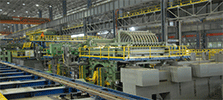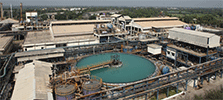OUR WORK IN INDIA

To support the Government of India’s action plans on energy efficiency and climate change, the Institute for Industrial Productivity India catalyzes projects for cleaner production in small and large companies, industry clusters and across supply chains. IIPI designs and demonstrates innovative models that give companies access to advanced technologies, enhance their competitiveness and facilitate compliance with environmental regulation.
Industry in India
- Industry uses more than half of the total commercial energy use in the country and GHG emissions account for 31% of India’s total GHG emissions (at 413 Mt in 2007, Ministry of Environment and Forests)
- Total industrial energy consumption between 2007 and 2050 is expected to grow 3.5 to 4.2 times under business-as-usual (IEA, 2011).
With Indian industry’s large energy and carbon footprint, there is great potential to save energy and address energy security, and to encourage low carbon growth. Against this background, the Government of India has launched the National Mission on Enhanced Energy Efficiency (NMEE), targeting large industrial energy consumers.
To support the Government of India’s efforts, IIPI encourages rapid diffusion of cleaner technologies in energy intensive industry sectors that will steer them on a low carbon development path.
Projects
IIPI in association with India’s Bureau of Energy Efficiency (BEE) launched a Knowledge Exchange Platform, which is focussed to accelerate the uptake of industrial energy efficiency in India’s most energy-intensive sectors, including textiles, chlor and alkali, aluminium, thermal power plants, pulp and paper, iron and steel, fertilizer, and cement. It is designed to bring together these sectors to facilitate the exchange of knowledge and information about energy efficiency best practices and help lagging industrial units improve the efficiency of their operations.
Within the large energy-intensive sectors, IIP India is presently focusing on cement and fertilizer, with active participation of respective industry associations. IIPI has embarked on an ambitious project to increase the use of Alternate Fuels and Raw (AFR) materials by the Indian cement industry through a multi stakeholder initiative. This effort, anchored in the Cement Manufacturers Association, aims to catalyze favorable policy changes that would further encourage the Indian cement industry’s AFR use. Such policy changes would complement the Bureau of Energy Efficiency’s (BEE) Perform Achieve and Trade (PAT) scheme.
IIPI is working with the private sector in India to design and demonstrate innovative business models – for example, the greening of supply chain of large corporations such as IKEA (involving energy and environmental assessments followed by project implementation, bundling of medium-scale energy efficiency projects); and market transformation with small yet heavy industry clusters.
A bottom-up participatory approach is followed in projects that were carried in Kolhapur and Bhavnagar industry clusters, aimed at deployment of energy efficient furnances in a group of similar units (foundries and steel re-rolling). Successful models were replicated in other clusters, leading to effective scale up.
Partners
To create effective delivery channels, IIPI works closely with industry associations, enabling them to leverage and scale-up energy and environmental performance efforts beyond IIPI’s assistance.
IIPI helps India’s Bureau of Energy Efficiency to frame and implement policies that support the development of an efficient, productive and cleaner industrial sector.


